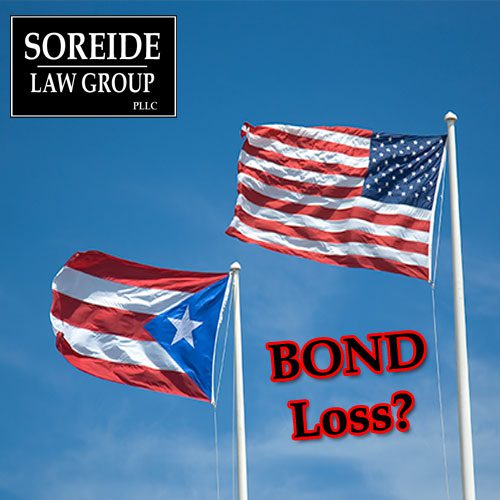A recent article by Schwab discusses how Puerto Rico's Economy, since the hurricane, is now going from bad to worse.
Some of the reasons outlined in the article were: Puerto Rico’s debt restructuring process will take longer which will result in lower recovery values less than originally expected. Schwab does not feel that Puerto Rico’s problems will carry over to the rest of the municipal bond market. Schwab feels Puerto Rico's bonds are speculative investments and they do not recommend them for muni investors looking for stable tax-advantaged income.
Long before Hurricane Maria, Puerto Rico's Economy was experiencing financial problems, struggling with an unsustainable debt load. Puerto Rico began a bankruptcy-like process in May of 2017 hoping to resolve some its financial problems, but unfortunately, the hurricane has only complicated the process.
The hurricane disaster in Puerto Rico has pushed any resolution of debt negotiations further into the future, and will likely lead to lower recovery values than many market investors in their debt might have expected.
Puerto Rico’s economy is likely to suffer as more people leave the island after the storm. The economic costs of a shrinking population will complicate the island’s efforts to get finances back in shape.
Schwab stated that they don’t believe Puerto Rico’s problems pose a risk to the broad municipal bond market. Puerto Rico ranks 10th among the states and U.S. territories in terms of outstanding municipal debt, it represents just 3% of the total muni market. They view Puerto Rico's bonds as speculative investments and do not recommend them to muni investors looking for conservative tax-advantaged income.
Puerto Rico has been struggling with a government debt crisis and poor demographics for years. Even though Puerto Rico is a US territory, it and its public corporations aren’t covered by U.S. Bankruptcy Code. Congress passed legislation, known as PROMESA, in 2016 that allowed the Puerto Rican government and its public corporations to enter into bankruptcy-like protection if they proved unable to service their debts. The legislation also established an oversight board to oversee Puerto Rico’s restructuring process.
The Schwab article states that Puerto Rico's government filed a petition to enter protection on May 3, 2017. The initial filing was for Puerto Rico’s $13 billion of constitutionally protected general obligation (GO) debt, but additional Puerto Rican entities have since filed for protection. Puerto Rico has many different types of debt backed by different legal claims to Puerto Rico’s resources. The process laid out by the PROMESA law allows a single judge to oversee all of the cases filed against Puerto Rico issuers, rather than treating them as separate cases.
The table below shows the different issuers. All but a few are currently in default.
All Puerto Rico bonds are speculative investments:
| Debt type |
Moody’s/S&P rating |
In default? |
Outstanding amount (billions) |
| General Obligation and Guaranteed |
Ca/D |
Yes |
$18.06 |
| Sales Tax Financing Corporation (Subordinate) (COFINA) |
Ca/D |
Yes |
$9.72 |
| Puerto Rico Electric Power Authority |
Ca/D |
Yes |
$8.96 |
| Sales Tax Financing Corporation (Senior) (COFINA) |
Ca/D |
Yes |
$7.58 |
| Government Development Bank for Puerto Rico |
C/NR |
Yes |
$4.13 |
| Puerto Rico Aqueduct & Sewer Authority (PRASA) Senior Debt |
Ca/CC |
No |
$3.89 |
| Highways and Transportation Authority 1998 Resolution |
C/D |
Yes |
$3.50 |
| Employees Retirement System |
C/CC |
No |
$3.16 |
| Infrastructure Financing Authority (Rum Tax) |
C/D |
Yes |
$1.78 |
| Public Finance Corporation (Lease Debt) |
C/D |
Yes |
$1.20 |
Sources: Standard &Poor’s and Moody’s for credit ratings, as of 10/16/17, Bloomberg for default status, as of 10/16/17, and Moody’s for “outstanding amount,” as of 5/4/17.
If you have Puerto Rican Bond losses call Soreide Law Group at 888-760-6552 to speak to a lawyer at no cost for a consultation regarding the possible recovery of your losses. No fee if no recovery. We represent clients nationwide before FINRA.

